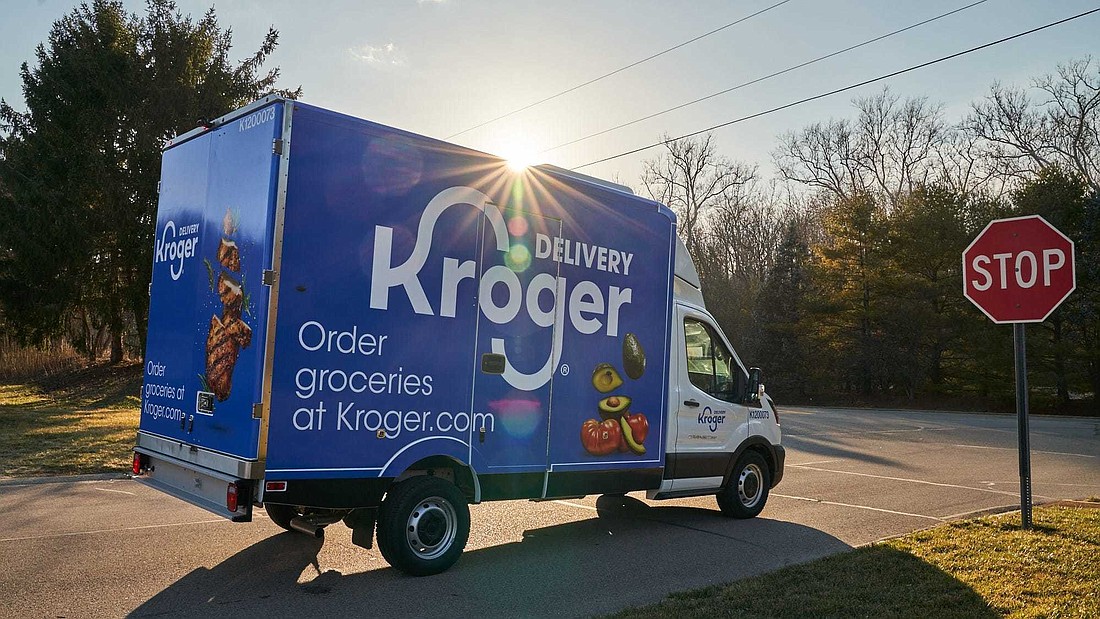
Cincinnati-based The Kroger Co. has begun delivering groceries in Jacksonville.
The company said in a June 9 news release that the “spoke” location to its Groveland “hub” will employ about 180 employees.
“Every citizen in Jacksonville should have access to affordable, healthy, and fresh foods,” Mayor Lenny Curry said in the release.
“We welcome Kroger into our community and are very encouraged that this delivery service will fill an important gap for people who don’t have easy access to groceries.”
Kroger Logistics has posted job openings for Jacksonville that include human resources, transportation and drivers.
That means one of the largest retailers in the world, with overall 2020 sales of $132.5 billion, is entering the state and area grocery business without a Kroger-branded storefront.
While Kroger products will be available for delivery, its only area store presence is a Harris Teeter in Nassau County. Kroger sold its interest in Lucky’s Market before that chain filed for bankruptcy.
Kroger Chairman and CEO Rodney McMullen said June 17 in the company’s first-quarter earnings conference call with analysts that the company opened its first facility powered by Ocado technology in Ohio in March.
He said Kroger launched delivery in June in Florida, calling that “a milestone moment in our history.”
It opened its Florida customer fulfillment center in Groveland, west of Orlando, and began its first deliveries from there in April when it soft-launched for friends and family.
“Our Kroger delivery team is ready to bring fresh, affordable food and a consistent customer experience directly to the doors of our customers,” McMullen said in the conference call.
“In addition to the Groveland CFC, a spoke in Tampa and Jacksonville are also now open.”
No date was given for the Jacksonville opening.
McMullen said the hub-and-spoke model allows Kroger to extend the range of its customer fulfillment centers by allowing the grocer to serve more customers directly to their door.
“And we are just getting started,” he said.
“Kroger’s data and personalization capabilities will contribute to increasingly meaningful ways to grow our e-commerce reach and capability.”
Each customer fulfillment center covers a delivery radius of up to 90 miles. The “spokes” extend that range.
In Florida, the Tampa and Jacksonville operations are “spokes” for the Groveland “hub.”
The 375,000-square-foot Groveland operation employs nearly 400 people and can fulfill thousands of orders per day, the release said.
In Jacksonville, the city issued a permit May 11 for Caddell Construction Co. LLC to build-out the North Jacksonville space at a cost of $205,000 for a Kroger logistics operation to deliver fresh groceries.
Kroger Fulfillment Network LLC, part of The Kroger Co., is the tenant for a 62,208-square-foot space at 1 Imeson Park Blvd., No. 200.
The Jacksonville project is described as a cross-dock for mercantile goods, which means goods are brought in and quickly shipped out to their destination.
Kroger spokesperson Teresa Dickerson acknowledged the plans May 12. “We are so excited about the Jacksonville Market,” she said by email.
In April, Supermarket News reported that Kroger started its “e-commerce model of the future” with the official launch of the first of 20 planned Ocado-powered automated warehouses for filling online grocery orders.
Supermarketnews.com said the 375,000-square-foot customer fulfillment center in Monroe, Ohio, north of Cincinnati, combines artificial intelligence, advanced robotics and automation to enable efficient fulfillment, picking and delivery.
Kroger said the customer fulfillment centers use technology from U.K.-based Ocado Group for the Kroger Delivery service.
Kroger does business in 35 states under two dozen banner names. As of Jan. 20, it operated 2,742 supermarkets.
Its annual Securities and Exchange Commission filing said 2,255 stores had pharmacies and 1,596 had fuel centers.
While sales, excluding fuel, fell 4.1% in the first quarter, digital sales rose 16%.
Kroger says that its fiscal 2020 sales were up 8.4% from $122.3 billion the year before.
“Customers are responding to the investments we have made in digital, as evidenced by our triple-digit growth in digital sales since the beginning of 2019,” McMullen said in the first-quarter news release.
Total company sales were $41.3 billion in the first quarter, compared with $41.5 billion for the same period last year. Excluding fuel, sales decreased 4%.
Retail Information Systems reported April 30 that Kroger ranks No. 6 among the world’s largest retailers based on market share.
Walmart was No. 1 with sales of $556 billion followed by Amazon.com at $386 billion.
Lakeland-based Publix Super Markets Inc. remains the No. 1 grocer in the North Florida/South Georgia trade market.
The Shelby Report of the Southeast trade publication reported in May that Publix is the leading grocer at almost 38.1% of the market share with 75 stores
Walmart Inc. is No. 2 with a 24.22% share with 107 stores.
Two Jacksonville-based Southeastern Grocers brands came in No. 3 and 4. Winn-Dixie had 17.6% of the market with 52 stores and Harveys Supermarket had 4.2% with 20 stores.
The data shows Harris Teeter with 0.85% with two stores, including one in St. Simons Island, Georgia, and Kroger at a 0.42% share with two stores in the South Georgia market.